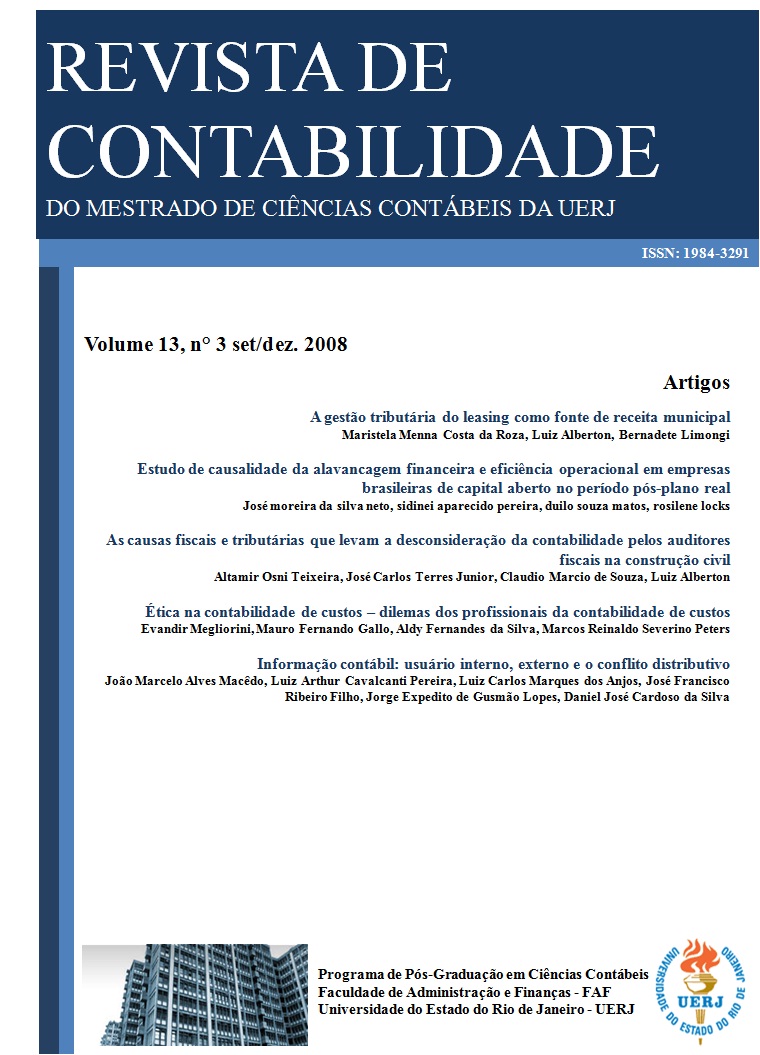A GESTÃO TRIBUTÁRIA DO LEASING COMO FONTE DE RECEITA MUNICIPAL
DOI:
https://doi.org/10.12979/rcmccuerj.v13i3.5537Resumo
Resumo
Este artigo busca evidenciar a evasão do Imposto sobre Serviços (ISS) em operações de leasing ocorrida
em um município do Rio Grande do Sul, nos anos de 2002 a 2006, e apresentar uma análise qualitativa,
por critérios ajustados da Regra-Matriz de Incidência Tributária (RMIT), quanto ao estudo da incidência e
do domicílio tributário do ISS. Trata-se de um estudo de caso exploratório-descritivo, com abordagem
quali-quantitativa, que abarcou o exame de 849 notas fiscais (NF) dos fornecedores de 20 arrendadoras, no
período de janeiro/2002 a dezembro/2006, referentes à transação de veículos via Leasing Financeiro
realizada naquele município. O que motivou este estudo foi a crescente procura por esse tipo de negócio e
as controvérsias sobre o tema. Os resultados quantitativos acumulados evidenciaram que essas operações
de leasing totalizaram R$ 28.494.712,78 - espelhando uma expressiva evasão fiscal de R$ 655.398,39 -,
enquanto as análises qualitativas demonstraram, especialmente, a constitucionalidade da incidência do ISS
e a legitimidade do local de seu recolhimento ao Município em Pesquisa. Entende-se que negligenciar a
fiscalização de operações de leasing e deixar de arrecadar essa fonte de receita afronta o que determina a
Legislação Tributária Nacional.
Palavras-Chave: Operações de leasing; ISS; Legislação tributária nacional.
ABSTRACT
The present article aims at evincing the evasion of the Tax upon Services (ISS) in leasing operations that
took place in a county in Rio Grande do Sul state, from 2002 to 2006, and to present a qualitative
analysis, the criteria of the Regra-Matriz de Incidência Tributária (RMIT) system, in what concerns the
study of the occurrence and the collection place of this tax. It consists of an exploratory descriptive case
study, with a qualitative and quantitative approach, which covered the examination of 849 receipts issued
by the furnishers of 20 leasing enterprises, from January 2002 to December 2006, related to the vehicle
transactions that took place in that county. The stimulus for developing such a research was the increasing
search verified for this kind of transaction and its controversies. The quantitative results showed that the
leasing operations amounted to R$ 28494712.78 which gave issue to a fiscal evasion of R$ 655398.39,
whereas the qualitative analysis showed that both the collection place of this tax and its demand are
constitutional and legitimate. The conclusion was that to neglect the control of the leasing operations and
the collection of this important source of state revenue is an affront to the National Tributary Legislation.
Keywords: Leasing operations; Tax upon services; National Tributary Legislation.
Downloads
Publicado
Como Citar
Edição
Seção
Licença
Os direitos patrimoniais dos artigos aceitos para publicação, inclusive de tradução, passam a ser de propriedade da Revista de Contabilidade do Mestrado em Ciências Contábeis da UERJ (online).
É permitida a citação parcial de artigos publicados, sem autorização prévia, desde que seja identificada a fonte. A reprodução total de artigos é proibida. Em caso de dúvidas, favor entrar em contato: (revistacontabilidadeuerj@gmail.com).
As declarações dos artigos aprovados, devem ser originalmente assinadas e enviadas pelos Correios para o endereço de contato da revista.


